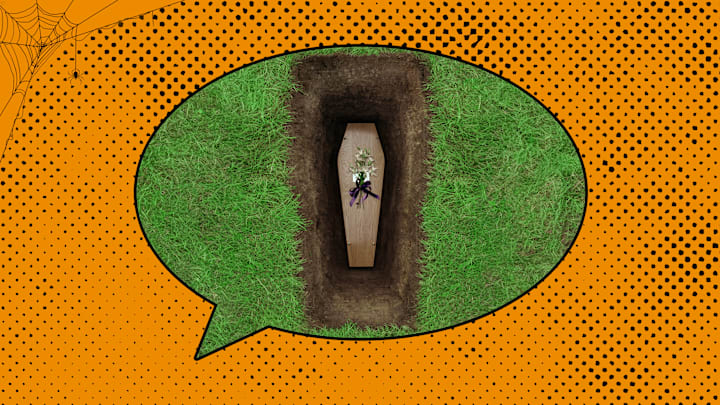We’re all going to die. And that means we’re all going to end up in a coffin (or an urn). Yikes. But Halloween is approaching, and at this time of year, the old bone box is more than a gruesome reminder of mortality: Coffins (which differ from caskets) are a classy bed for vampires or something zombies claw their way out of, making it a good time to look back at old slang terms for coffins you might want to use this spooky season.
Chicago Overcoat
In Windy City mob lingo, overcoats have nothing to do with outerwear and everything to do with coffins and the watery graves. Green’s Dictionary of Slang defines the term Chicago overcoat as “the practice of sealing corpses in cement prior to disposing of them at sea.” Raymond Chandler used it in 1937’s The Big Sleep: “ ‘Go ahead and blast and see what it gets you.’ ‘A Chicago overcoat is what it would get you, little man.’.” On the other hand, Chicago piano (or devil’s piano) was slang for a Thompson sub-machinegun, which was often wielded by Chicago mobsters (and possibly the last thing you saw before you got your Chicago overcoat).
Wooden Overcoat and Pine Overcoat
Wooden overcoat—which makes slightly more sense as a slang term for a coffin than Chicago overcoat—dates back to the late 19th century. And that’s not the only version of the term; an 1890 example from an Illinois newspaper uses yet another variation: “I enlisted under the Democratic banner when I was 15 years old, and my service will last until I put on my pine overcoat and cease to worry my neighbors.” You can still see pine overcoat on occasion, as indicated by a 1996 use in Denver Westword: “Williams was fitted for a pine overcoat long before the gods would have claimed a more clean-living man.”
Wooden Doublet
This term—yet another that pairs coffin building material with an article of clothing—pops up in Theodosius Forrest’s 1761 book Ways to Kill Care: “Where to find a guardian for the bawling brat, in case papa ... should suddenly tumble into his wooden doublet.” (Today we might call a coffin “the ol’ wooden windbreaker.”) Wooden doublet can also mean “human flesh,” as in this example from 1794 that wouldn’t sound out of place in a horror film: “Our grosser flesh, a kind of Jack in the box, whose wooden doublet fits him so nicely that every body thinks it alive.”
Wooden Kimono
If overcoats and doublets aren’t your thing, then there’s this culturally dubious term, which popped up around 1911 and appeared in Mezz Mezzrow and Bernard Wolfe’s 1946 book Really the Blues: “I expected the man to turn up ... with his tape measure to outfit me with a wooden kimono.”
Six-foot Bungalow
This jaunty term, which dates back to 1920, initially referred to a grave, per this use in the San Antonio Evening News: “We are a believer in peddling flowers ante-mortem, instead of waiting until they dig the ‘six-foo byungalow’.” By the mid-1930s, it was also a slang term for coffin.
Meat Basket and Cold Meat Box
Green’s defines the term meat basket as “a portable wicker ‘coffin’ used to convey a corpse to the morgue.” R.L. Bellem used it in Speed Detective in 1943: “A detachment of morgue attendants had loaded him in a wicker meat basket.”
A similar term from the early 19th century is cold meat box, which is just one of several terms spun out from cold meat, meaning “a corpse.” (We would not advise calling a wake a “cold-meat party.”)
Many terms for coffins are euphemistic, but these two are dysphemic. Dysphemisms are the opposite of euphemisms in that they’re explicit and maybe a little too honest, like calling a cigarette a “coffin nail.”
Scold’s Cure
Not even coffins could escape sexism. According to Green’s, the phrase scold’s cure, meaning “funeral, coffin,” referred to “the misogynistic concept that only death would silence a nagging woman.” Nap the scold’s cure meant “to be placed in one’s coffin.”
Pillbox
This humorous term for “Something likened to a pillbox, esp. in size, as a very small or cramped space, vehicle, etc.; something paltry or inconsequential,” in the words of the OED, was used as a slang term for a coffin at least once, in T.C. Haliburton’s 1840 book The Clockmaker: “Packed up in a snug pill-box in the same grave-yard.” That’s a tight fit for the rest of eternity.
Eternity Box
Speaking of eternity, this term for a coffin comes from Francis Grose’s Classical Dictionary of the Vulgar Tongue, an early slang dictionary dating to the late 1700s. It’s certainly a different spin on the coffin than the next term.
Bone Box and Bonehouse
When it was first recorded in Grouse’s dictionary, bone box was slang for the mouth. Later, the term was included in the 1976 Sydney Slang Dictionary with an entirely different meaning: “The Parson is on the highfly in a fantail banger and a milky mill toy. He got the cant of togs from a shickster whose husband’s in a bone-box. [translation] The ‘Parson’ is begging as a poor gentleman in a long broadcloth coat and a while shirt. He talked the change of clothes from a lady whose husband is buried.” A coffin can also be called a “bonehouse” (a term that had earlier applied to a mortuary). These bone-related terms, like the meat-centric ones, are on the honest-to-the-point-of-uncomfortable dysphemic side of things.
Dead Wood
Well, this gives a new, and appropriate, spin to the HBO series. Dead wood popped up around the mid-1800s, appearing in Francis A. Durivage and George P. Burnham’s 1846 book Stray Subjects, Arrested and Bound Over in poetic form: “I foller not the trade / I did afore they made my bed / With mattock and with spade, / And I was took to my last home, / And in the dead wood laid.”
Discover More Old Slang Terms:
